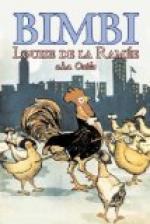She was erect there on her Sevres throne, with the light thrilling and throbbing upon her in every point. But she thought of the sweet, dark, fresh nights in the old home where the blackbird had slept, and she longed for them.
The dancers came and went, the music thrummed and screamed, the laughter was both near and far; the rose tree was amidst it all. Yet she felt alone—all alone! as travelers may feel in a desert. Hour succeeded hour; the night wore on apace; the dancers ceased to come; the music ceased, too; the light still burned down upon her, and the scorching fever of it consumed her like fire.
Then there came silence—entire silence. Servants came round and put out all the lights—hundreds and hundreds of lights—quickly, one by one. Other servants went to the windows and threw them wide open to let out the fumes of wine. Without, the night was changing into the gray that tells of earliest dawn. But it was a bitter frost; the grass was white with it; the air was ice. In the great darkness that had now fallen on all the scene this deadly cold came around the rose tree and wrapped her in it as in a shroud.
She shivered from head to foot.
The cruel glacial coldness crept into the hot banqueting chamber, and moved round it in white, misty circles, like steam, like ghosts of the gay guests that had gone. All was dark and chill— dark and chill as any grave!
What worth was the place of honor now?
Was this the place of honor?
The rose tree swooned and drooped! A servant’s rough hand shook down its worn beauty into a heap of fallen leaves. When they carried her out dead in the morning, the little Banksia-buds, safe hidden from the frost within their stems, waiting to come forth when the summer should come, murmured to one another:—
“She had her wish; she was great. This way the gods grant foolish prayers, and punish discontent!”
LAMPBLACK
A poor black paint lay very unhappy in its tube one day alone, having tumbled out of an artist’s color box and lying quite unnoticed for a year. “I am only Lampblack,” he said to himself. “The master never looks at me: he says I am heavy, dull, lustreless, useless. I wish I could cake and dry up and die, as poor Flake-white did when he thought she turned yellow and deserted her.”
But Lampblack could not die; he could only lie in his tin tube and pine, like a silly, sorrowful thing as he was, in company with some broken bits of charcoal and a rusty palette knife. The master never touched him; month after month passed by, and he was never thought of; the other paints had all their turn of fair fortune, and went out into the world to great academies and mighty palaces, transfigured and rejoicing in a thousand beautiful shapes and services. But Lampblack was always passed over as dull and coarse, which indeed he was, and knew himself to be so, poor fellow, which made it all the worse. “You are only a deposit!” said the other colors to him; and he felt that it was disgraceful to be a deposit, though he was not quite sure what it meant.




